Danny Glover gives East West Players/Robey Theatre Company’s revival of Philip Kan Gotanda’s Yohen plenty of movie-star box-office draw, but Gotanda’s delicate, perceptive “portrait of a marriage” and Yohen’s luminous leading lady June Angela deserve better than Glover’s lackadaisical performance as a retired African-American soldier estranged from his Japanese wife of thirty-plus years.
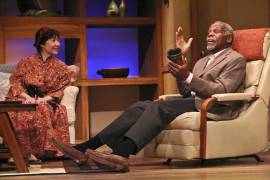 The year is 1986, the place Gardena, then the U.S. city with the highest percentage of Japanese-Americans, and longtime residents James (Glover) and Sumi (Angela) have reached a turning point in their decades-long marriage.
The year is 1986, the place Gardena, then the U.S. city with the highest percentage of Japanese-Americans, and longtime residents James (Glover) and Sumi (Angela) have reached a turning point in their decades-long marriage.
Two weeks ago Sumi sent James packing and only today has she agreed to see him for a “first date” that she hopes will rekindle some of the magic lost over the years since he returned to the States with a Japanese post-WWII bride.
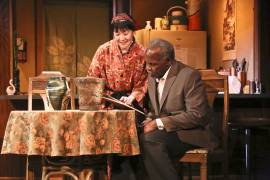 Since the couple’s trial separation, the once promising amateur boxer been crashing with a friend while coaching local kids at a neighborhood club while his heretofore stay-at-home wife has signed up for pottery classes, her first step towards a degree in Japanese Art.
Since the couple’s trial separation, the once promising amateur boxer been crashing with a friend while coaching local kids at a neighborhood club while his heretofore stay-at-home wife has signed up for pottery classes, her first step towards a degree in Japanese Art.
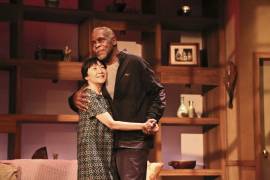 It’s clear from the get-go that James and Sumi’s marriage has been one of opposites attracting, and not merely because Glover’s James towers over Angela’s Sumi. He chugs beers while she sips green tea. He tells jokes that she doesn’t appreciate. He coaches teens that she considers thugs.
It’s clear from the get-go that James and Sumi’s marriage has been one of opposites attracting, and not merely because Glover’s James towers over Angela’s Sumi. He chugs beers while she sips green tea. He tells jokes that she doesn’t appreciate. He coaches teens that she considers thugs.
No wonder then that things have gone sour, at least for Sumi, in a marriage that may—or may not—be beyond repair.
Over the course of seven weeks, Yohen charts James’s attempts to win Sumi back, meetings that reveal cracks in a relationship that had once been so promising, or at least until a fresh-from-Japan Sumi discovered that one American GI is not like another, and that by marrying a black man in the pre-Civil Rights 1950s, she would not be given the open-armed welcome she might have received had she wed someone white.
Along the way, Sumi introduces James to yohen, defined as an “accident in the kiln firing that results in transformation of the pot.” “To some,” Sumi explains, “it looks ugly. To others, beautiful.” A metaphor for James and her mixed marriage, perhaps?
It’s easy to see why the Asian-American East West Players and the African-American Robey Theatre Company decided to bring Glover back from their original 1999 co-production, the Lethal Weapon franchise star being about as sure a ticket-seller as either company could wish for.
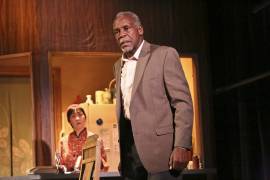 Unfortunately, whether as a result of age (Glover is ten years older than James’s 61), or being accustomed to multiple movie takes, or being given a pass by director Ben Guillory, a hesitant Glover inserts a “You know” or “I mean” into virtually every one of James’s lines, all but about half-a-dozen of them unscripted. Had Glover given Gotanda’s script the respect it deserves, his performance might have gone beyond merely warm and folksy. As is, it is one of the sloppiest pieces of acting I’ve seen in over ten years of reviewing L.A. theater.
Unfortunately, whether as a result of age (Glover is ten years older than James’s 61), or being accustomed to multiple movie takes, or being given a pass by director Ben Guillory, a hesitant Glover inserts a “You know” or “I mean” into virtually every one of James’s lines, all but about half-a-dozen of them unscripted. Had Glover given Gotanda’s script the respect it deserves, his performance might have gone beyond merely warm and folksy. As is, it is one of the sloppiest pieces of acting I’ve seen in over ten years of reviewing L.A. theater.
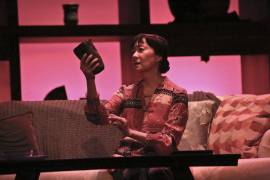 All of this places an added burden on leading lady Angela, a challenge to which the Best Lead Actress Tony nominee rises in a performance as precise as Glover’s is rambling. Delicate on the outside but with a core of steel, Angela’s Sumi is a richly layered portrait of a woman coming into her own, and even without Michael Ricks’s exquisite lighting design, she is positively luminous.
All of this places an added burden on leading lady Angela, a challenge to which the Best Lead Actress Tony nominee rises in a performance as precise as Glover’s is rambling. Delicate on the outside but with a core of steel, Angela’s Sumi is a richly layered portrait of a woman coming into her own, and even without Michael Ricks’s exquisite lighting design, she is positively luminous.
Christopher Scott Murillo’s stunning set (lovingly decorated by properties designer Glenn Michael Baker) is one of his (and EWP’s) finest and Naila Aladdin Sanders’s costumes reveal much about the characters wearing them.
Sound designer Corinne Carrillo underscores scene changes with some intoxicating jazz instrumentals, but with just one slow-moving stagehand to add and remove props between scenes, transitions take twice as long as they should, and Carrillo’s hit-and-miss amplification proves distracting.
Brandon Hong Cheng is stage manager and Matthew Sanchez is assistant stage manager.
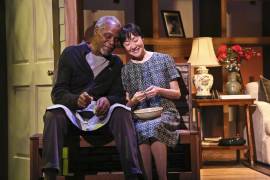 What could have been a must-see season opener ends up a disappointment for both East West Players and Robey Theatre Company. Yohen is as imperfect as the pots that bear its name.
What could have been a must-see season opener ends up a disappointment for both East West Players and Robey Theatre Company. Yohen is as imperfect as the pots that bear its name.
East West Players, David Henry Hwang Theatre, 120 Judge John Aiso St., Los Angeles.
www.eastwestplayers.org
–Steven Stanley
November 1, 2017
Photos: Michael Lamont
Tags: Danny Glover, East West Players, Los Angeles Theater Review, Philip Kan Gotanda, Robey Theatre Company



 Since 2007, Steven Stanley's StageSceneLA.com has spotlighted the best in Southern California theater via reviews, interviews, and its annual StageSceneLA Scenies.
Since 2007, Steven Stanley's StageSceneLA.com has spotlighted the best in Southern California theater via reviews, interviews, and its annual StageSceneLA Scenies.







 COPYRIGHT 2024 STEVEN STANLEY :: DESIGN BY
COPYRIGHT 2024 STEVEN STANLEY :: DESIGN BY